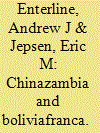|
|
|
Sort Order |
|
|
|
Items / Page
|
|
|
|
|
|
|
| Srl | Item |
| 1 |
ID:
087275


|
|
|
|
|
| Publication |
2009.
|
| Summary/Abstract |
Despite a longstanding focus on the systemic distribution of power in the study of international relations, scholarship during the past 20 years increasingly emphasizes the role of domestic politics in foreign-policy-decision making. This simulation enables participants to experience negotiating an international issue-a territorial dispute between two fictitious states, Chinazambia and Boliviafranca-in the context of this "two-level game" between domestic and international environments. The simulation furnishes a vantage point from which students can assess realist, liberal, and alternative theoretical perspectives on international relations as they affect policy making. The simulation is flexible and can be executed under a variety course contexts, as well as time and participation constraints. Additionally, the simulation provides ample opportunity for a number of enriching postsimulation activities.
|
|
|
|
|
|
|
|
|
|
|
|
|
|
|
|
| 2 |
ID:
133155


|
|
|
|
|
| Publication |
2014.
|
| Summary/Abstract |
How do negotiation and mediation affect the likelihood of insurgent victory in counterinsurgency (coin) wars? We develop expectations regarding the incentives of the combatants to negotiate and accept mediation while a coin war is under way, and the evolution of these incentives as a war progresses. Thirty nine civil wars are examined in which a foreign power intervenes to defend a central government against an insurgency during the period 1945-2009. We identify the subset of coin wars in which negotiations and mediation were attempted or took place, as well as their timing. The study examines whether the resort to these two instruments affects the subsequent duration and outcome of coin wars. We find that the resort to negotiations and mediation accelerates the time to insurgent victory, and explore reasons why political leaders in foreign powers would pursue such a path given the consequences of such action.
|
|
|
|
|
|
|
|
|
|
|
|
|
|
|
|
| 3 |
ID:
120824


|
|
|
|
|
| Publication |
2013.
|
| Summary/Abstract |
Will a strategy change toward one of "hearts and minds" alter the eventual outcome of the American-led allied war effort in Afghanistan? We investigate this question by analyzing 66 cases of counterinsurgency warfare from the twentieth century in which a foreign power seeks to defend a central authority in a state or colonial territory against an insurgency. We identify whether and when a foreign power implemented a change in its counterinsurgency strategy, whether said change involved a shift toward a strategy reflecting a hearts and minds emphasis, as well as the foreign power's eventual success or failure in prevailing over insurgents. We find that while shifting toward a strategy of hearts and minds increases the chances for success, the improvement is modest and requires nearly a decade to produce. Furthermore, we find that the impact of a strategy change is conditional on the timing of the change, with a "window of opportunity" associated with success closing after approximately eight years of war. Our findings bode poorly for allied efforts in contemporary Afghanistan.
|
|
|
|
|
|
|
|
|
|
|
|
|
|
|
|
| 4 |
ID:
078491


|
|
|
|
|
| Publication |
2007.
|
| Summary/Abstract |
Central to the contemporary American foreign policy debate is the issue of reducing insurgency and promoting stability in Iraq and the role of American military forces in achieving these outcomes. Military force-related proposals range from complete withdrawal to a moderate "surge" in troops to a massive escalation of the force commitment. Here, we draw upon an analysis of domestic political stability in 60 imposed political systems occurring during the period 1816-1994 to forecast the effectiveness of said force-related proposals. The analysis underscores, in part, that (i) a policy of surging American troops is unlikely to succeed, (ii) a policy of belated massive escalation reduces insurgency, but much less so than an initial policy of massive invasion coupled with massive occupation, a strategy that preempts the development of a robust insurgency
|
|
|
|
|
|
|
|
|
|
|
|
|
|
|
|
| 5 |
ID:
091368


|
|
|
| 6 |
ID:
082411


|
|
|
|
|
| Publication |
2008.
|
| Summary/Abstract |
What effect do third parties have on the evolution of civil wars? The authors argue that intervention by third parties is central to the civil war process, a process that is characterized by the duration of hostilities and the type of outcome. The authors examine empirically the effect of third-party intervention into civil wars during the period 1816-1997, using the event history framework of competing risks. From the perspective of competing risks, as a civil war endures, it is at risk of experiencing a transition to one of three civil war outcomes in our sample: military victory by the government, military victory by the opposition group, and negotiated settlement. The competing risks approach provides considerably better leverage on the dynamic qualities of civil wars and, in particular, the influence of interventions by third parties. The analysis suggests that third-party interventions can be decisive in the evolution of civil wars and that third-party interventions have a different effect on the duration than different civil war outcomes. The results show that third-party intervention decreases the time until the supported group achieves military victory. Furthermore, third-party interventions, on both the government and opposition sides, increase the time until a negotiated settlement
|
|
|
|
|
|
|
|
|
|
|
|
|
|
|
|
|
|
|
|
|